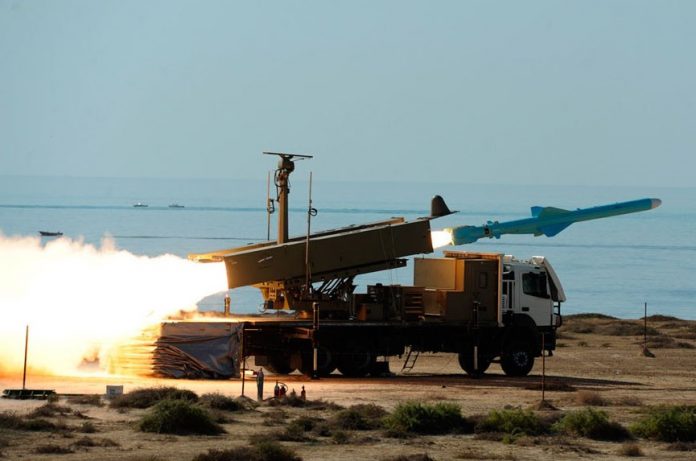Hezbollah’s anti-tank missiles attack at IDF base on the Sep. 03 was a swift retaliation; the armed group responded quickly to the Israeli airstrikes that had targeted accurate missile facilities belonging to the Iranian-linked groups in Syria, Iraq and Lebanon. Yet few could disagree that Hezbollah-Iran’s accurate missiles program does not carry serious strategic-military implications to the region’s stability.
Recently, the Israeli Intelligence Agency has provided proof about Iran’s efforts to upgrade the missile arsenal of its proxy groups, especially Hezbollah in Lebanon. This development would enhance Tehran’s regional position, but the consequences will deepen the security dilemma between Israel and the Iranian-Hezbollah axis.
Counter-attack on Trump’s strategy
For Tehran, engaging in a more assertive policy towards Washington’s allies would be a pressing matter as long as Trump’s “maximum pressure” campaign continues. A central strategic aim for Iran is to resist the U.S. pressure without provoking war in the Persian Gulf. The Iranian leadership is aware that challenging the economic sanctions and the U.S. military presence would not be through waging direct attacks against the U.S.’s interests and targets in the Gulf.
Indeed, Washington is not interested in such confrontation, but testing Trump’s uncertainty could generate massive retaliation, which could cost Tehran more than it could handle. Furthermore, if attacks on oil tankers continue in the Gulf, it may jeopardise Tehran’s ability to isolate the U.S. administration globally. And then, it could put its diplomatic effort — in terms of reviving sort of deal with European countries — at risk.
Simply, by enhancing the capability of Iran’s proxy groups outside the Gulf region, the Iranian regime would not only demonstrate failure in Trump’s policy to change the Iranian regime behaviour, but it can also show its growing ability to impose further strategic threats to Washington’s allies, particularly Israel’s security.
The Iranian-Israeli rivalry
Tehran is seeking to improve its maneuverability against Israel. The Iranian regime wants to emphasise that its influence from Iraq and Syria to Lebanon has become fait accompli; no one can overcome. And that Iran, not Israel is the one who decides the rules of the game in the region.
On the ground, the risk of Iran’s missile development could be translated in many ways. First, the Israeli leadership is being forced to change their security priority, or at least to focus on the missiles issue as an urgent threat.
Over the past years, the growing Iranian influence close to the Israeli-Syrian border has been a top priority issue for Israel’s security. The IDF has launched air campaign to counter Tehran’s entrenchment in Syria, and to limit its effort of transferring qualitative weaponry to Hezbollah. In turn, it was crucial for Tehran to remain in low-profile to build on gains it has achieved in Syria since 2011.
According to the Israeli Intelligence assessment for 2019, the Islamic Republic of Iran has recalculated its regional plan due to Israeli air-attacks in Syria, so Tehran is taking further steps to strengthen its influence in Lebanon and Iraq.
Today, the accurate missiles project that Tehran runs in the region is a game-changer. An unnamed Israeli security source told Ynet that, while Iran’s nuclear program remains the first priority, in the last three months, the Israeli defence establishment has prioritised the threat of the accurate missiles program over the risk of Tehran’s effort to “entrench itself” in Syria.
Second, the diffusion of Iran’s accurate missiles will enhance the effectiveness of Iran and Hezbollah’s ability to project power against Israel. The latest Israeli airstrike in Iraq targeted a storehouse contains missiles that range up to 700 kilometres. With these ranges, Iran’s missiles can hit sensitive locations in Israel from anywhere in northern Iraq and Syria.
Israel is also concerned about upgrading the accuracy of Hezbollah’s arsenal. According to an article published in the Washington Post, the Israeli leadership fears Hezbollah’s effort of transforming the existing primitive arsenal of 130,000 rockets into accurate guided missiles. If a large-scale production is achieved with an accuracy less than 10 meters, Hezbollah will maximise its military deterrence in facing Israel.
Third, transferring advanced technology to Hezbollah to produce accurate missiles in Lebanon will complicate Israeli measures. As a result of the Israeli attempts to prevent Iran from delivering off-the-shelf, advanced missiles to Hezbollah, Tehran has intensified efforts to supply Hezbollah with the required materials, equipment and experts to produce advanced missiles in facilities located inside Lebanon.
Meanwhile, Iran could reduce the risk of the Israeli airstrikes on its facilities inside Syria. And the Israeli decision-makers will find themselves in a dilemma. Attacking targets inside Lebanon could lead to potential retaliation from Hezbollah, and maybe intense war, like what happened in 2006’s war between Israel and Hezbollah.
Pre-emptive war against Lebanon
Due to the strategic-military advantages that Iran and Hezbollah are seeking to achieve, the Israeli leadership could initiate a pre-emptive war to deter Hezbollah from obtaining an advanced offensive capability. Maybe it is hard for the Israeli government now to take such decision, but there are Israeli voices that believe, stopping Hezbollah’s threat today at any cost is better than receiving hundreds of its accurate missiles in the future.
Giora Eiland, the former head of the Israeli National Security Council, stresses that the Israeli Cabinet should think carefully about how effective would be the current Israeli military strategy. While a few airstrikes on Hezbollah’s sites would not eliminate the present and future strategic threat, initiating a pre-emptive open war against the full capability of Hezbollah will potentially do the required job.
Two factors would also affect the Israeli Cabinet’s decision. The Israeli Air Force (IAF) today has a complete operational superiority over Lebanon. This situation could change if Hezbollah gets access to effective air-defence missiles, which would complicate the IAF’s mission against the critical military facilities in Lebanon in the future.
The other factor is limiting Israel’s ability to collect intelligence about Hezbollah’s missiles development activities. As Hezbollah chief, Hassan Nasrallah, clarifies in a recent speech, Hezbollah will take serious step to counter “Israeli drones violating Lebanon’s sovereignty.” Such action may obscure critical information that the Israeli leadership needs. The lack of intelligence could intensify the security dilemma. Then, the option of open war against Lebanon could be seen more feasible in the eyes of the Cabinet members.
The accurate missiles program is a strategic security threat to Israel. It is unlikely that the Israelis can accept a shrinking role in the regional balance of power with Iran and Hezbollah near their border, in which case an open war could be seen a viable option. Achieving stability in the region requires diplomatic efforts and comprehensive arrangements as the option of war brings high costs to all actors.
The views and opinions expressed in this article are those of the author and do not necessarily reflect the official policy or position of The Geopolitics.

Nasser Khdour is a freelance writer. He writes on topics related to Middle East security, the Persian Gulf security, and the Israeli-Palestinian conflict. He has a master’s degree in strategic studies for the Strategic and Defence Studies Centre at the Australian National University. He also holds a master’s degree in international studies from Birzeit University in Palestine. Nasser is currently working on a research project about the Saudi-Israeli alignment and potential security outcomes.


